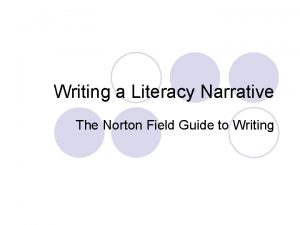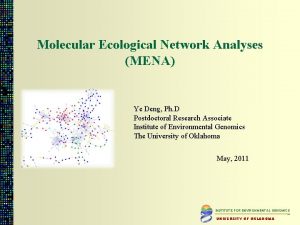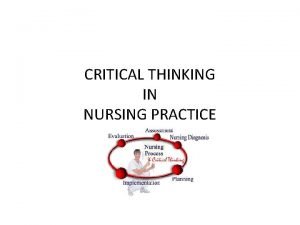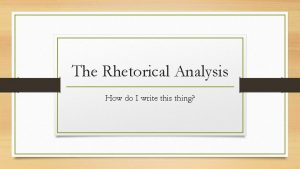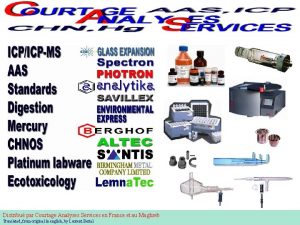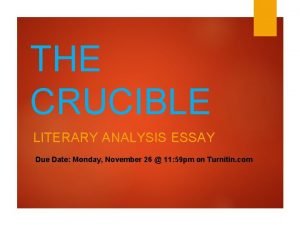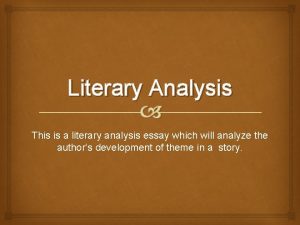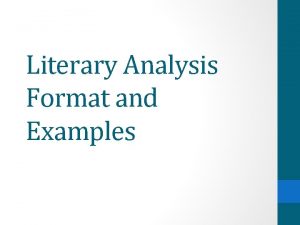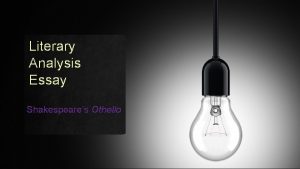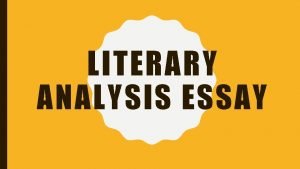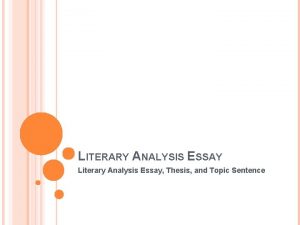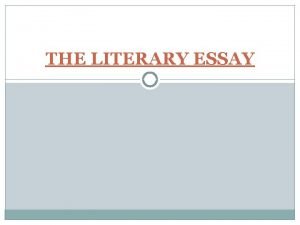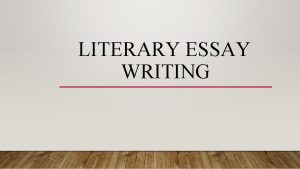Literary Analysis Essay Norton Field Guide Literary analyses









- Slides: 9

Literary Analysis Essay

Norton Field Guide “Literary analyses are essays in which we examine literary texts closely to understand their messages, interpret their meanings, and appreciate their writers’ techniques” (81). “A literary analysis is a form of argument; you are arguing that your analysis of a literary work is valid. Your thesis, then should be arguable” (85).

“The Diamond Necklace” & “Mother to Son” What SHARED element(s) link(s) “The Diamond Necklace” and “Mother to Son”? ◦ Tone? Attitude that the author [or speaker, character] has about a subject ◦ Motif? Recurring concept(s) within, between, among works of literature ◦ Theme? A complete statement that establishes a (universal) truth about humanity.

The Big Idea: What are the authors trying to say through their respective works? Use either of the paired readings [“Poison” with “Mark of the Beast” OR “The Destructors” with “The Hollow Men”] to create a multi-paragraph essay of 3 -5 pages developing a shared element and the significance of this element in the understanding of each work.

Norton Field Guide 82 -4 Analysis of Percy Bysshe Shelley’s “Lift not the painted veil which those who live” by Stephanie Huff Thesis: This absence of truth is exactly what Shelley chooses to address as he uses metaphors of grim distortion and radiant incandescence to expose the counterfeit nature of our world. Topic Sentences: ¶ 1: The speaker of Shelley’s poem presents bold assertions about the nature of our society. ¶ 2: This painted veil does not completely obstruct our view but rather distorts what we can see.

Topic Sentences (continued) Notice the placement of the quoted material in the topic is NOT recommended—it can be too confining and lead to difficulties later in the paragraph. Also, what might be a concern with topic 5? ¶ 3: Most people, however, do not realize that the shapes and images seen through the veil are distorted because all they know of life is the veil—this life we see as reality only “mimic[s] all we would believe” (3), using “colours idly spread” (4) to create pictures that bear little resemblance to that which they claim to portray. ¶ 4: What really lies behind this façade are fear and hope, both or which “weave / Their shadows, o’er the chasm, sightless and drear” (56). ¶ 5: This chasm does not include all people, however, as we are introduced to one individual, in line 7, who is trying to bring to light whatever truth may yet remain.

Evidence & Analysis Does each topic have enough evidence to define it, defend it, and / or develop the topic and thesis? How has the evidence been included? How has it been developed? [Analysis] ◦ Is the analysis clearly related to the quoted evidence? ◦ Does the writer reference the quote?

“Poison” & “Mark of the Beast” What idea(s) or element(s) are present in BOTH pieces? What purpose is served by its use? [What meaning is created? What is the author’s purpose? ] How do you want to develop your argument based upon your understanding of the texts?

“The Destructors” & “The Hollow Men” What idea(s) or element(s) are present in BOTH pieces? What purpose is served by its use? [What meaning is created? What is the author’s purpose? ] How do you want to develop your argument based upon your understanding of the texts?
 What are the key features of a literacy narrative
What are the key features of a literacy narrative Concln
Concln Examples of critical thinking in nursing practice
Examples of critical thinking in nursing practice Rhetorical analysis
Rhetorical analysis Courtage analyses services
Courtage analyses services The crucible body paragraph
The crucible body paragraph Conclusion clincher
Conclusion clincher The first day edward p jones summary
The first day edward p jones summary How to write a hook for a literary analysis essay
How to write a hook for a literary analysis essay Literary analysis essay prompts
Literary analysis essay prompts
